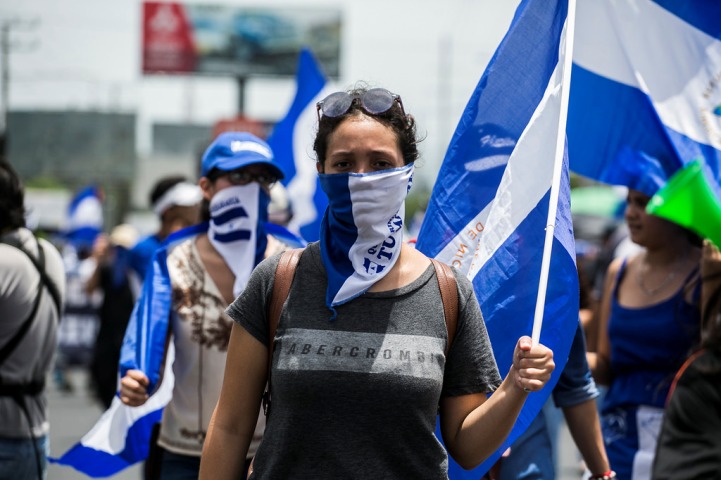Serious human rights violations continue to be perpetrated in Nicaragua Govt: report
The report found that the persecution by the Government of Nicaragua of real or perceived opponents has become more refined.

Serious systematic human rights violations, tantamount to crimes against humanity, continue to be perpetrated by the Nicaraguan Government for political reasons, the Group of Human Rights Experts on Nicaragua said in their latest report today, detailing how the situation has deteriorated over the last year.
“President Ortega, Vice-President Murillo and the high-level State officials identified in the investigation should be held accountable by the international community, as should Nicaragua as a State that goes after its own people, targeting university students, Indigenous people, people of African descent, campesinos, and members of the Catholic Church and other Christian denominations,” said Jan Simon, the Chair of the Group of Experts.
The report found that the persecution by the Government of Nicaragua of real or perceived opponents has become more refined. Violations, abuses and crimes have been perpetrated not only to dismantle active opposition efforts, but also to eliminate all critical voices and dissuade, in the long term, any new organization and initiative of social mobilization.
As the Government has neared its goal of total destruction of critical voices in Nicaragua, patterns of violations of the right to life, security and integrity of the person have grown less prevalent. Instead, in 2023, there has been an exponential increase of patterns of violations focusing on incapacitating any kind of opposition in the long term.
“Nicaragua is caught in a spiral of violence marked by the persecution of all forms of political opposition, whether real or perceived, both domestically and abroad,” said Simon. “In addition, the Government has solidified a spiral of silence incapacitating any potential opposition.”
Angela Buitrago, a member of the Group of Human Rights Experts, said “the persecution extends beyond Nicaragua's borders, with Nicaraguans abroad facing deprivation of nationality and legal identity, lack of access to official documentation and consular support, as well as other violations impeding family reunification and affecting extensively conditions for earning a living.”
Nicaraguan citizens have been left stateless and devoid of access to legal remedies, and many Nicaraguans are suffering from similar conditions caused by statelessness. Family members of victims of human rights violations are themselves victimized by the Government only for being related to real or perceived Government opponents.
These “violations by extension” are particularly serious when they affect children, who have been subjected to violations due to their relationship with, or the activities, and/or opinions expressed by their parents or family members. Many children have been separated from parents who were deported or banned from entering Nicaragua, and some have been denied valid passports to join their parents.
The report also highlights the consolidation and centralization of all State powers in the hands of President Ortega and Vice-President Murillo, particularly the total control exerted over the judicial branch.
“Centralization of power not only ensures impunity for perpetrators, but also undermines efforts towards accountability, said Ariela Peralta, another independent expert. “The Government has ensured that it remains in an increasingly solid bubble to perpetuate itself in power and annihilate anyone attempting to break that bubble.”
The Group of Experts said that the enacted Amnesty Law further entrenches impunity by shielding serious human rights violations, including extrajudicial executions, arbitrary detention, and torture, from prosecution. The Group of Experts said that such amnesty provisions are incompatible with Nicaragua's obligations under international human rights law, particularly the Convention against Torture and Other Cruel, Inhuman or Degrading Treatment or Punishment.
The Group called on the Government to immediately release all persons arbitrarily deprived of their liberty, cease violations, abuses and crimes, particularly persecution on politically motivated grounds, and undertake exhaustive, independent, and transparent investigations of documented violations, abuses, and crimes to hold perpetrators accountable.
The Group urged the international community to take immediate action by expanding sanctions against individuals and institutions involved in human rights violations. Sanctions are a minimum form of accountability in a country where impunity and criminalizing democracy is the rule.
Other recommendations included ensuring fair access to identification and status determination procedures for Nicaraguans deprived of their nationality, those forced to leave or those who have been denied entry into the territory of Nicaragua. The Group called on the International Community to make use of its findings in security, financial and trade relations and policies, be it within the framework of Financial Action Task Force, the International Monetary Fund, or when conditioning preferential access of Nicaragua to markets on compliance with Non-Trade Policy Objectives, inter alia.
“The effect on the Nicaraguan population is devastating,” said Simon. “It will take the people of Nicaragua and the international community a significant amount of time and resources to recover everything lost under the rule of President Ortega and Vice President Murillo.”
- READ MORE ON:
- Nicaragua










